Are you interested in understanding the energy footprint of your pressure washer? You’ve come to the right place. Our comprehensive knowledge guarantees you’ll get the most accurate information.
How much electricity does a Pressure Washer use?
Electric pressure washers are relatively economical, using just enough current to operate efficiently. To determine power consumption, check the pump rating label indicating wattage. If not labeled with amps, multiply the voltage by watts to calculate consumption.
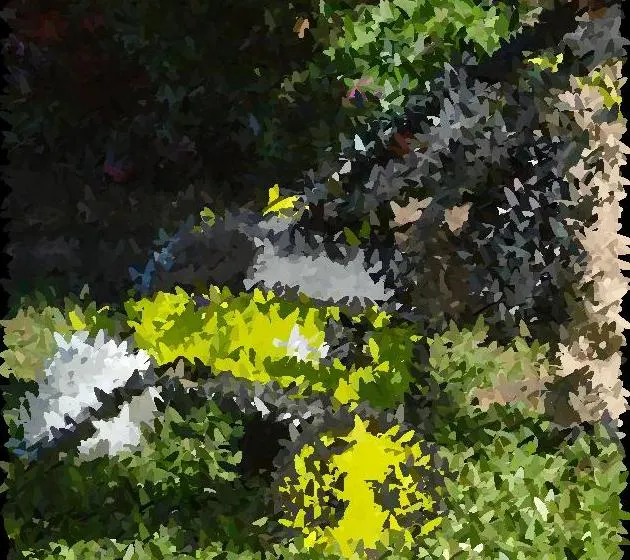
Are we thinking about the electricity usage of your cleaning equipment? We’ve explored the electric pressure washer. Our detailed guide will provide you with accurate information about its power consumption. Continue reading to delve deeper!
Contents
- 1 Do electric pressure washers use a lot of electricity?
- 2 Does a low power supply cause the motor in an electric pressure washer to stop working
- 3 Electric pressure washers: Are they dangerous?
- 3.1 ● Always wear protective gear/clothing
- 3.2 ● Carefully read the user manual
- 3.3 ● Electric shock is a real threat to power washers
- 3.4 ● Do not place or use an electric washer on a wet surface
- 3.5 ● Do not climb ladders
- 3.6 ● Keep off alcohol and intoxicating drugs
- 3.7 ● Keep pressure washer away from flammables
- 3.8 ● Keep the machine from children
- 3.9 ● Beware of high pressure and keep hold of the trigger.
- 4 Do electric power washers save energy?
- 5 Keeping your electric pressure in good condition: What you should know
- 6 Advantages of electric pressure washers over gasoline-powered washers
- 7 What is cycling in electric pressure washers?
- 8 Remarks
Do electric pressure washers use a lot of electricity?
The next question we wanted to help you answer is, how much energy does an electric pressure washer use? Based on the above calculations, they are relatively economical with energy consumption. Electric pressure washers draw just enough current to keep them running efficiently.
They can generate a maximum of 2100 psi, which is relatively low compared to about 5100 psi with gasoline-powered variants. Thus, contrary to what most people would want to imagine, electric pressure washers do not use a lot of energy.
Most models deliver psi between 1300 and 1400, sufficient for domestic cleaning duties. You should check the pump rating to know how much power electric pressure washers draw apart from our calculations above.
• Power Consumption Rating: Amperes and Watts
The labeling is on the pump, near the point it connects with the central unit, indicating your machine’s wattage. If these machines’ power consumption rating is not shown in amperes, you will spot it in watts of power. Remember that the standard voltage for homes is 120.
Multiply the voltage by amps to get the exact power consumption rate. Depending on the size of the job, the equipment used, and how long it’s run, a high-pressure wash can use between 1.5 and 12.5 kWh of electricity per hour.
That means, in a month, it could add anywhere from 1.5 to about 375 kWh to your electric bill. Of course, this is just an estimate. Your actual power usage will vary depending on the size of the equipment, how much water per minute it uses, and how long you run it.
In my 20 years of experience, I’ve observed that the electricity a pressure washer uses is influenced by its power rating, operating pressure, and duration of use. These factors are interrelated, and understanding them can help optimize energy usage.
• Estimating Electricity Usage of Pressure Washers
For example, if you run your pressure washer for 2 hours every weekend, it would use between 12 and 100 kWh of electricity per month. This could add between $1.20 and $10 to your monthly electric bill, assuming an average cost of 10 cents per kWh.
Remember, these are just estimates. Your actual costs will depend on your local electricity rates, how often you use your pressure washer, and the size of the jobs you’re doing. If you’re using it for large jobs or running it for several hours, your costs could be higher.
Also, don’t forget to factor in other costs, such as water usage and labor costs. A pressure washer uses about 2-3 gallons of water per minute. So, if you run your pressure washer for 2 hours, you could use between 240 and 360 gallons of water.
• Efficiency of Electric Pressure Washers
If you’re in an area where water is expensive, this could significantly increase your costs. In conclusion, while electric pressure washers use electricity, they are not as power-intensive as you might think.
They are designed to be efficient and use only as much power as they need to get the job done. So, while they do use electricity, they are still a very economical choice for most home and garden cleaning tasks.
Does a low power supply cause the motor in an electric pressure washer to stop working
First, you should note that electric pressure washers depend on electric current. Once you power them on, you should ensure consistency in the power supply.
However, there may be instances of motor failure. When the motor stops suddenly in the middle of a washing routine, we advise that you do the following:
- Check the power cord: Is the power cord connected? If not, you should fix it right away. However, something else might be the problem if the cord is connected correctly.
- Check the fuse box (the main one) for connection problems. It would be best if you fixed the tripped circuit breaker right away.
- Also, check GFCI. It could trip, causing the motor in your electric pressure washer to stop. However, you must do a few things when testing GFCI for faults. Start plugging it into a working power outlet, then reset the main switch. To ensure that repeated tripping does not occur after you power the washer, do not connect a GFCI-protected outlet with a GFCI-protected power cord. It would be best to have That rule of thumb at your fingertips for safety’s sake.
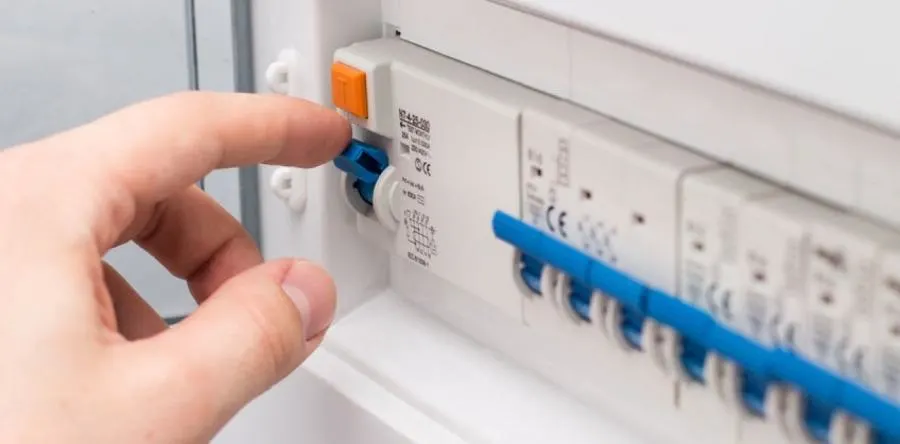
• The Role of Cords, Switches, and GFCI
Every time an electric motor stops suddenly, the bottom line is that cords, switches, or GFCI are the most likely culprits. These machines require a constant power supply, ensuring amperage does not drop below optimal.
Most importantly, ensure no gadget draws in a lot of power connected to the same circuit as the power washer. Some appliances that consume much power are refrigerating units, heaters, coffee makers, and motors.
Any expert will tell you that overloaded circuits cause tripping and breakdown in the wiring system. Fuses will also blow when you overload a power unit.
Electric pressure washers: Are they dangerous?
Water and electricity do not mix, so you would want to ask why we use electric pressure washers. Well, vital safety tips come with every home machine you wish to use. With power washers that use electricity, carelessness is something you should guard against by all means necessary.
The danger is always lurking from the risk of electrocution, circuit breaks, tripping to fire hazards. Does it, therefore, mean you should altogether avoid electric pressure washers? Well, you only need to be extra careful. It is easy to prevent electrocution, especially if you consider the following safety tips:
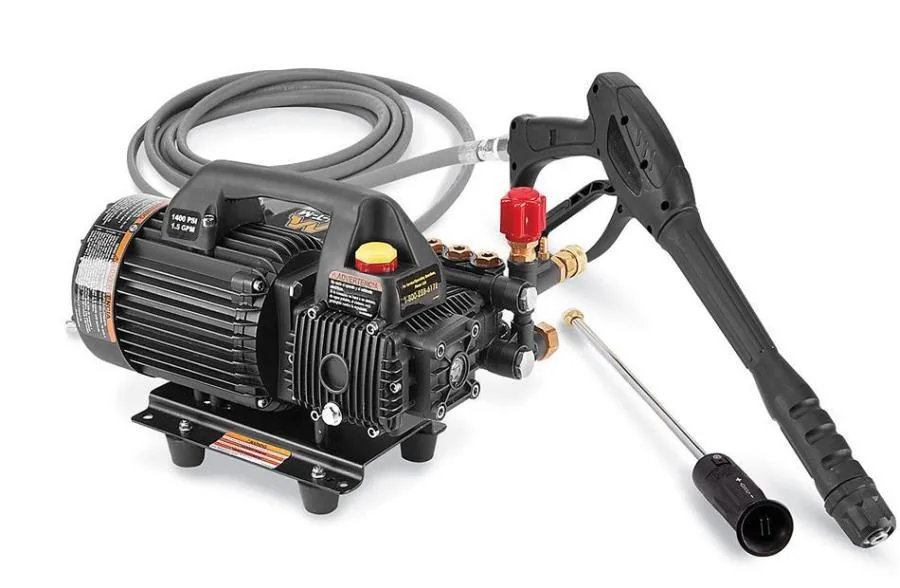
● Always wear protective gear/clothing
Before powering your electric washer, protecting yourself from harm’s way is an essential precautionary measure. You need protective gear such as goggles, gloves, and knee-high boots.
You may not need earplugs because, compared to gasoline-powered washers, electric pressure washers are relatively quiet when in use. The boots should protect you from a real risk of electrocution.
● Carefully read the user manual
A user manual should be first read after buying an electric pressure washer. It will educate you about a few tips on using the machine and take you through vital safety tips. The instructions, especially on safety precautions, are often comprehensive and straightforward.
Getting acquainted with instructions that touch on an emergency would be best. Take, for example, dealing with a fuse blow. How do you react? Let’s reserve that for another discussion.
● Electric shock is a real threat to power washers
Electric shock, mild or strong, is standard in machines like pressure washers. But you can avoid it. It would be best if you did not mix electricity with water. Parts with water, including the nozzles, should be far from the section to which an electric cord connects.
It is on this premise that we strongly advise against using extension cords. Extension cords often lower the efficiency of the GFCI if not ultimately damaging your electric washer. Most importantly, cover exposed sections of the extension cord to avoid the risk of electrocution.
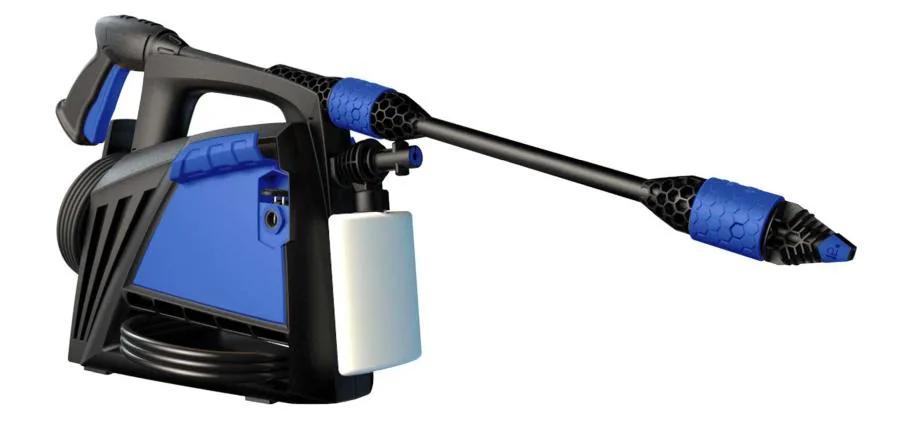
● Do not place or use an electric washer on a wet surface
Let’s emphasize that water and electricity are two extremes that don’t mix. Any mishap that causes mixing would be catastrophic to a cleaner and an electric washer. If wet floors do not present a real risk of electrocution, there is a high chance of sliding or falling.
● Do not climb ladders
Ladders are handy, especially when you want to clean high walls. However, we advise against using them in this situation. You may fall due to a powerful kickback from an electric washer. Use a wand with an extension as a safety measure.
● Keep off alcohol and intoxicating drugs
Operating machines like an electric power washer while intoxicated presents a real danger of electrocution. The impact of substance abuse on one’s mind is not something we want to talk about now. However, drinking before operating a machine will cause some massive problems, if not death.
● Keep pressure washer away from flammables
Another vital safety tip for using an electric pressure washer is to avoid a flammable liquid. Anything that catches fire notwithstanding should be far from the machine.
● Keep the machine from children
Electric pressure washers can also be a real threat to kids, especially the playful ones who want to touch anything.
For parents or adults who want to train children to use these machines, we recommend taking them through a comprehensive training session. Always emphasize the need to take precautions when using machines that use electricity.
● Beware of high pressure and keep hold of the trigger.
While the maximum pressure you can get with an electric pressure washer is 2100psi, you should take precautions when it peaks. For example, point a power washer nozzle to your skin, an animal, or anyone nearby.
The power these machines eject water can cause considerable damage to surfaces. You may also have bruised skin when you direct the nozzle to your body. Thus, it would be best never to lose control of the trigger.
When you are not running water into the unit, lock the trigger. As soon as you finish washing your car or any surface using a power washer, release pressure from the unit by pulling the trigger.
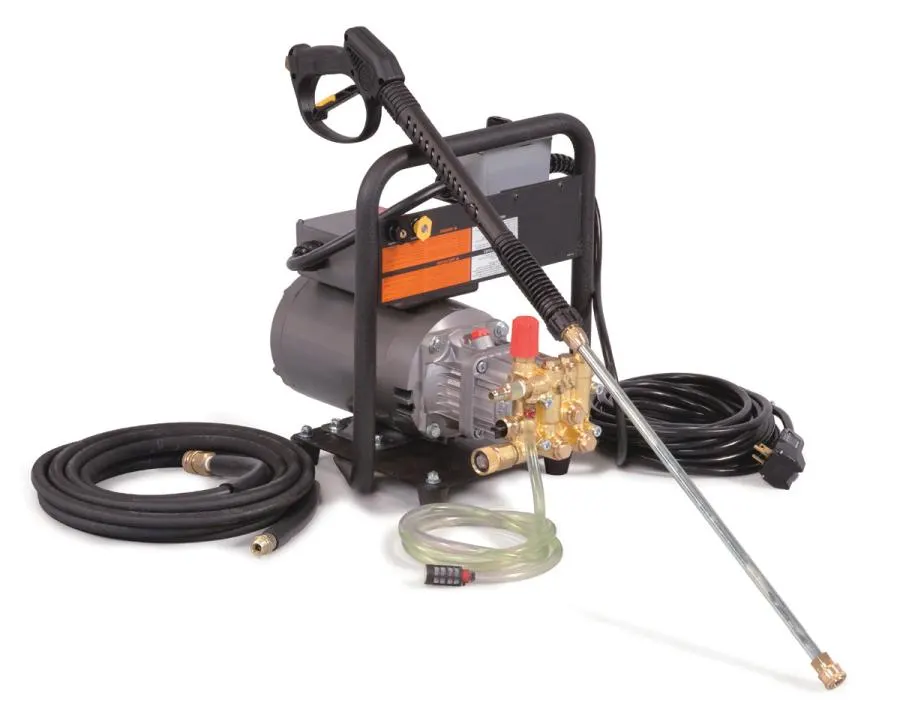
Do electric power washers save energy?
With the above safety tips on using electric pressure washers, the next question most people ask is, do these machines save energy? We already noted that they are utility machines that everyone or every homesteader needs, but at what utility cost?
It would be best to worry about high power bills besides owning one. Will using an electric washer increase the cost of energy cost? If so, how do you go about saving on energy costs? Well, the wattage rating of these machines often varies.
• Energy Consumption of Electric Power Washers
You may, therefore, want to go for a small unit. But because these are machines you will use once in a while, their energy consumption rate is not something you should worry about. Washing your car using a power washer should take only a few minutes.
For power-intensive cleaning tasks, we advise that you should not keep your machine running continuously. Only push the trigger gun when you must clean something.
A common misconception is that all pressure washers use the same amount of electricity. In reality, electricity usage can vary significantly depending on the model and its use.
Keeping your electric pressure in good condition: What you should know
Maintaining machines like electric pressure washers makes them more efficient. After prolonged use, you should expect some components, such as power cords, to wear out or tear. Some parts will also develop electrical faults. With these concerns comes another question.
How do you ensure your power washers remain in good working condition? First off, do not operate an electric pressure washer indoors. Keep your workstation dry to avoid the risk of electrocution.
We know your hands will get wet sometimes, but avoid the temptation of touching the electric plug. When it comes to the maintenance of electric pressure washers, the following tips should help:
- Check the trigger gun: Always check the trigger gun for faults. If it does not work correctly, the chances are high that there is a connection problem.
- Check the arrestors: You should always pay close attention to spark arrestors and mufflers, especially if your power wash has them.
- Check the spray gun: Another maintenance tip for electric pressure washers is to check the spray gun to ascertain a proper connection to the machine’s other components. Misconnections often cause water leakage, something you don’t want to experience with electrical machines.
- Check the wiring: Ensure proper wiring for safety and proper working of the unit. Use a plastic casing to cover open or broken wires before they cause electrocution.
- Consult the owner’s manual: Most importantly, read the user manual. It should teach you how to troubleshoot a washer should it malfunction. You do not want to handle an electric gadget without knowledge of the dangers of electricity. We recommend visiting a service center from our end of the bargain to check your machine for damage and repair.
Advantages of electric pressure washers over gasoline-powered washers
When you have a power washer, cleaning tough stains on driveways, outdoor cooking areas, and even your car becomes a breeze. However, the level of efficiency you will get with a gasoline-powered washer and an electric variant is never the same.
The next question, therefore, is which advantages electric washers have over gasoline-powered variants. Well, we researched this too and found out the following:
● They save money
Everyone wants to save money. Of course, we do, and so does anyone else who wants to buy a good pressure washer that is affordable yet makes the most of it.
But given that gasoline-powered washers are best suited to commercial/industrial use, not to mention their high pressure out, they cost a lot of money. On leading e-commerce platforms, you can find a good electric pressure washer for less than $150.
Owning these machines is also cheaper than hiring cleaning services at an average cost of $200 or more. Gasoline-powered variants cost more and given that they depend on fuel, your operational cost will double, if not triple.
● They are less noisy
Most, if not all, gasoline-powered machines produce a lot of noise. Some will force you to wear earplugs to secure your eardrums from potential damage.
Moreover, if you are not complaining about the high rate of fuel consumption or portability problems due to their massive sizes, the noise will be too much to handle, even for neighbors. On the contrary, electric washers often run quietly.
The type of job significantly impacts a pressure washer’s electricity usage. For instance, cleaning a driveway typically requires higher pressure and longer usage time than washing a car, leading to more electricity consumption.
● Promote the use of clean energy
At a time when the world is working towards the realization of clean and renewable energy, you don’t want to take the opposite direction. Gasoline-powered pressure washers contribute to environmental pollution.
They are noise pollutants and release considerable CFCs into the atmosphere. Should the world take global warming seriously, we may never have gasoline-powered machines like pressure washers in shops.
● The best for home cleaning
You do not need a high-powered pressure washer to clean decks, driveways, outdoor grills, and cars. Thus, an excellent electric pressure washer is good enough to blast off stubborn stains. Even more important is that they are portable and easy to store.
What is cycling in electric pressure washers?
First, cycling only occurs in electric power washers because of the pressure switch. There is no pressure switch in gasoline-powered variants.
Cycling happens when the motor starts and stops without pulling the trigger. It happens because of power water leakage. Check the unit, including o-rings and connection points, to ascertain the cause before further action.
Remarks
An excellent electric pressure washer should make cleaning tasks easier and save money. They consume an average of 1.5kw, which is not a lot because you will not power on your pressure washer every day.
For companies that provide cleaning services, at a cost, of course, the cost of energy that comes with using power washes is a little high compared to the amount of money they earn every day.

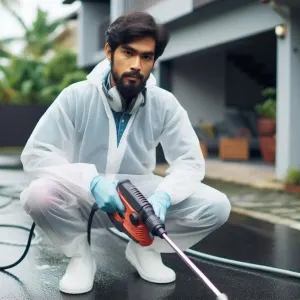
I didn’t know about the difference in energy consumption between electric and gasoline pressure washers.
Thank you for your feedback, Tonya! I’m glad you found the information about energy consumption differences between electric and gasoline pressure washers helpful. Let me know if you have any more questions.
Does a higher PSI rating mean higher energy consumption for a pressure washer?
Electric pressure washers are relatively energy-efficient. The power consumption amount will depend on the wattage of the machine. So, a higher PSI rating doesn’t necessarily mean higher energy consumption.
The maintenance tips are very useful for ensuring the longevity of my pressure washer.
Thank you for your feedback, Kaylee! We’re thrilled to hear that the maintenance tips helped you. If you have any questions about the energy footprint of your pressure washer, feel free to ask.
I appreciate the detailed explanation on the power consumption of pressure washers.
Thank you for your feedback, Alfred! I’m glad you found the information helpful. If you have any more questions about pressure washer power consumption or maintenance, feel free to ask.
What safety precautions should I take when using a pressure washer?
Make sure you always wear protective gear like goggles and gloves when using a pressure washer to ensure safety. Proper maintenance and energy-saving tips are crucial for efficient operation.
This article is very informative and helpful.
Thank you so much, Candice! I’m thrilled that you found the article informative. Let me know if you have any other questions about pressure washer energy usage.
I never thought about the electricity consumption of pressure washers before.
Electric pressure washers are more energy-efficient than you might think. If you want to know more about their electricity consumption, keep reading our detailed guide for accurate information. Thank you for your comment!
Great article. I will definitely be more careful when using my pressure washer from now on.
Thanks for your positive feedback, Felix! If you’re interested in learning more about the energy efficiency of pressure washers, keep reading for detailed information on power consumption. Enjoy your future pressure washing with caution!
This article has opened my eyes to the importance of proper maintenance for electric pressure washers.
Thank you, Genesis Bryant! We’re glad the article resonated with you. Understanding the energy footprint of your electric pressure washer is crucial for efficient usage. Your feedback is appreciated!
Can you recommend a budget-friendly electric pressure washer?
I recommend the Sun Joe SPX3000 Electric Pressure Washer for a budget-friendly option. It’s efficient and reliable, ensuring you get the best value for your money.
Is it safe to use an electric pressure washer on a wooden deck?
Yes, it is safe to use an electric pressure washer on a wooden deck. Just be sure to adjust the pressure to prevent damage. Enjoy your cleaning project!
I appreciate the environmental benefits mentioned in the article.
Thank you, William Mills! I’m glad you found the environmental benefits mentioned in the article valuable. Stay tuned for more detailed information on energy consumption and efficiency of pressure washers.
I didn’t realize the impact of water usage on the electricity bill when using a pressure washer.
Glad you found the information helpful, Devon. Understanding the energy usage of your pressure washer is key to managing your electricity bill efficiently. Let me know if you have any more questions!
Great information about how to estimate the electricity usage of pressure washers.
Thank you for your positive feedback on estimating electricity usage for pressure washers. I’m glad you found the information helpful and accurate!
The advantages of electric pressure washers over gasoline-powered ones are convincing.
Thank you, Dale! If you’re interested in the energy consumption of electric pressure washers, check out our detailed guide on power usage. You’ll be surprised by the efficiency!
I never knew pressure washers could be so energy-efficient!
Thank you, Anita! Electric pressure washers are indeed energy-efficient. If you need more info about energy consumption, feel free to ask.
Good tips on maintaining an electric pressure washer for optimal performance.
Thanks for your positive feedback, Annie! If you have any more questions about electric pressure washers, feel free to ask. Happy cleaning!
The safety tips provided are crucial when using electric pressure washers.
Thank you, Philip! We agree that safety tips are crucial with electric pressure washers. If you’re interested in understanding their energy usage, our blog has comprehensive information for you.
The explanation about cycling in electric pressure washers was very insightful.
Thank you, Miguel! I’m glad you found the information on electric pressure washers insightful. Stay tuned for more detailed guides on energy footprints and power consumption of cleaning equipment.